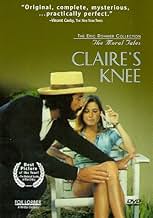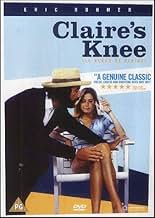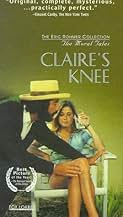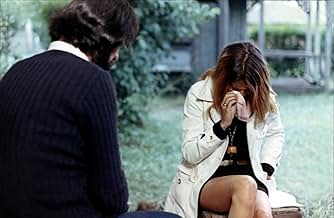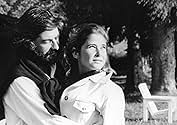On lakeside summer holiday, a conflicted older man is dared to have a flirt with two beautiful teenage half-sisters despite his betrothal to a diplomat's daughter and the fact that the girls... Read allOn lakeside summer holiday, a conflicted older man is dared to have a flirt with two beautiful teenage half-sisters despite his betrothal to a diplomat's daughter and the fact that the girls have boyfriends.On lakeside summer holiday, a conflicted older man is dared to have a flirt with two beautiful teenage half-sisters despite his betrothal to a diplomat's daughter and the fact that the girls have boyfriends.
- Awards
- 6 wins & 4 nominations total
- Director
- Writer
- All cast & crew
- Production, box office & more at IMDbPro
Featured reviews
In "les Liaisons Dangereuses", Isabelle de Merteuil defies Sebastien de Valmont to deflower Cécile de Volanges, a young girl, then to seduce and to reject Marie de Tourvel, a married woman. If he succeeds in accomplishing it, the bounty will be Isabelle herself.
Nothing as harsh in "Le genou de Claire", but there is the similar thematic about a gamble. Jérome (Jean Claude Brialy) meets Aurora (Aurora Cornu), an old friend (lover?). Aurora, a writer, is in search of a new story for a possible novel. She offers Jérome a gamble in the form of a love game ("marivaudage" as we say in French) involving Laura (Beatrice Romand), his neighbors daughter, who is obviously attracted by him, and, later, the Laura's sister Claire (Laurence de Monaghan) whose knee fascinates Jérome.
Unlike "The Dangerous Liaisons", not a single ounce of violence or dramatic events, everything will be just metaphorical: a half-stolen kiss and a stroked knee (and no excessive promised reward from Aurora). "Le Genou de Claire" is a filmed essay about friendship, love, sensuality, desire, fantasies and their incoherences.
As usual with Eric Rohmer, thoughts and emotions have to be said and not just shown, therefore everything is explicitly said by the characters. This is the reason why the Rohmer's movies seem unrealistic and talkative to the unprepared audiences. Some say that Rohmer is a writer who uses a camera instead a pen, but that primacy of the dialog doesn't prevent Rohmer to use the actor's play, the camera, the set's and costumes colors in a very accurate way. In fact, he is a real film director with a very personal style of cinematic language.
The cast: A Jean-Claude Brialy bearded like a pirate plays a charming young diplomat and he delivers his lines with natural ease and a sensual chemistry between him and the beautiful Aurora Cornu (a Romanian poet, novelist, and actress). Unfortunately the Romanian actress doesn't seem at ease with those long lines in French, and, in my humble opinion, she overplays quite a bit.
Beatrice Romand, 18 years old at that time, in her first true part in a movie, plays the 16 yo Laura. She steals the show, the light and the camera, and in view of some mind-blowing shots, for example in the Jérome's room, she seems to have been an obvious delicacy to light up for the great master Néstor Almendros, in charge of the cinematography. When the movie was released in 1970, the French medias became suddenly obsessed for a while by this very young actress, her exotic beauty and riveting charm. The clever and fizzy Béatrice appeared everywhere in the magazines and on the 2 (not more than two in 1970!) channels of the French TV! Then the fame faded away. The industry of entertainment prefers the blonds... The Beatrice's fans (I am a Beatrice's fan!) love Rohmer's "Le Beau Marriage", "Conte d'Automne" and Claude Faraldo's "Themroc", a situationist weird movie.
Laurence de Monaghan, in contrast with the dark haired and milky skinned Beatrice Romand, plays Claire, a tanned blond of cold beauty, in fact a perfect arrogant and stuck-up chick with perfect body, legs and knee, the famous knee, object of Jérome's desire.
For the fans of Fabrice Luccini, his short part as the young Vincent pontificating about girls is a "collector", not to be missed! By the way, still for his fans, not to be missed too there is his hilarious (and sulfurous) part in Walerian Borowczyk's "Contes Immoraux" (Immoral Tales) 2 years later. Keep in mind that "Le Genou de Claire" forms a part of Rohmer's "Contes Moraux" (Moral Tales)...
Time has passed, "Le Genou de Claire" remains amongst the Rohmer's most sensuous movie, and Claire's knee keeps on fascinating.
Nothing as harsh in "Le genou de Claire", but there is the similar thematic about a gamble. Jérome (Jean Claude Brialy) meets Aurora (Aurora Cornu), an old friend (lover?). Aurora, a writer, is in search of a new story for a possible novel. She offers Jérome a gamble in the form of a love game ("marivaudage" as we say in French) involving Laura (Beatrice Romand), his neighbors daughter, who is obviously attracted by him, and, later, the Laura's sister Claire (Laurence de Monaghan) whose knee fascinates Jérome.
Unlike "The Dangerous Liaisons", not a single ounce of violence or dramatic events, everything will be just metaphorical: a half-stolen kiss and a stroked knee (and no excessive promised reward from Aurora). "Le Genou de Claire" is a filmed essay about friendship, love, sensuality, desire, fantasies and their incoherences.
As usual with Eric Rohmer, thoughts and emotions have to be said and not just shown, therefore everything is explicitly said by the characters. This is the reason why the Rohmer's movies seem unrealistic and talkative to the unprepared audiences. Some say that Rohmer is a writer who uses a camera instead a pen, but that primacy of the dialog doesn't prevent Rohmer to use the actor's play, the camera, the set's and costumes colors in a very accurate way. In fact, he is a real film director with a very personal style of cinematic language.
The cast: A Jean-Claude Brialy bearded like a pirate plays a charming young diplomat and he delivers his lines with natural ease and a sensual chemistry between him and the beautiful Aurora Cornu (a Romanian poet, novelist, and actress). Unfortunately the Romanian actress doesn't seem at ease with those long lines in French, and, in my humble opinion, she overplays quite a bit.
Beatrice Romand, 18 years old at that time, in her first true part in a movie, plays the 16 yo Laura. She steals the show, the light and the camera, and in view of some mind-blowing shots, for example in the Jérome's room, she seems to have been an obvious delicacy to light up for the great master Néstor Almendros, in charge of the cinematography. When the movie was released in 1970, the French medias became suddenly obsessed for a while by this very young actress, her exotic beauty and riveting charm. The clever and fizzy Béatrice appeared everywhere in the magazines and on the 2 (not more than two in 1970!) channels of the French TV! Then the fame faded away. The industry of entertainment prefers the blonds... The Beatrice's fans (I am a Beatrice's fan!) love Rohmer's "Le Beau Marriage", "Conte d'Automne" and Claude Faraldo's "Themroc", a situationist weird movie.
Laurence de Monaghan, in contrast with the dark haired and milky skinned Beatrice Romand, plays Claire, a tanned blond of cold beauty, in fact a perfect arrogant and stuck-up chick with perfect body, legs and knee, the famous knee, object of Jérome's desire.
For the fans of Fabrice Luccini, his short part as the young Vincent pontificating about girls is a "collector", not to be missed! By the way, still for his fans, not to be missed too there is his hilarious (and sulfurous) part in Walerian Borowczyk's "Contes Immoraux" (Immoral Tales) 2 years later. Keep in mind that "Le Genou de Claire" forms a part of Rohmer's "Contes Moraux" (Moral Tales)...
Time has passed, "Le Genou de Claire" remains amongst the Rohmer's most sensuous movie, and Claire's knee keeps on fascinating.
This is one of the best movies of Rohmer's earlier series of moral tales. The movie wonderfully depicts the complicated relatioship between the hero and his desires, represented by Claire, and the reality of Claire's younger sister, who as masterfully played by Beatrice Romand. This is a wonderful comedy of manners, in which we can laugh at all the characters, how in their attempts to fool others, they only fool themselves. Rohmer has intricately plotted every action, I enjoyed every moment of the film.
After a dispiriting encounter with THE COLLECTOR (1967), the fourth number of Rohmer's SIX MORAL TALES, I feel elated that the fifth entry CLAIRE'S KNEE has rekindled my passion in Rohmer's body work, his superlative insight as regards self-boosting pretension over real agenda inward has reached a high-point in this basically nothing-has-happened miniature.
A high-flying diplomat Jérôme (Brialy) has returned to Lake Annecy to sell his family house, one month prior his wedding, he will marry the woman who he has an on-and-off relationship over 6 years. By sheer chance, he meets his old friend, the novelist Aurora (Cornu), who has lodged in Madame Walter's (Montel) lake house at the foot of the mountain nearby, to finish her latest novel.
While the two reminisce about the past and update each other with information of the intervening years, Aurora is slightly agape to know that Jérôme decides to tie the knot, in her view, he is not a marrying type, but Jérôme claims that he and her fiancée has reached a perfectly and mutually understanding phrase - an open relationship as long as there is nothing too serious to undercut their marriage, which implies that two-timing is not a problem at all.
Later Aurora introduces Jérôme to Madame Walter and her teenage daughter Laura (Romand), who, strikes up a crush on Jérôme. Aurora is stuck in writer's block, so Jérôme volunteers to be her guinea pig, to explore the situation with Laura, then reports back to Aurora with all the details. Laura is genial, precocious, coruscating with contradictory ideas (the love/dispute relation with her mother, bored/fascinated by the picturesque scenery), she is not afraid to admit her feelings for Jérôme, but when the latter attempts a wet kiss, she brushes him aside, teases that she wants to be totally in love, not with a soon-to-be-married man, yet the truth is that she will embark on her study in Britain, sooner than Jérôme's due date.
Jérôme enjoys Laura's company, takes her mountain hiking and riding in his motorboat, tries to cop a feel when timing is proper and fails epically, but how can any man not lap up the gratifying feeling of being the receiving end of a teenage girl's passing fancy?, although Laura's candid sophistication is something saps him of any further actions. However, before soon, Laura is no longer his main focal point, because Claire (de Monaghan), Laura's slightly older half-sister, a sultrier blonde arrives, so is her boyfriend, a muscle-showboating jock Gilles (Falconetti). Jérôme involuntarily develops a fetish for Claire's knee, tender, smooth and immensely arousing for his taste, he confesses to Aurora, and takes the ultimate task: to touch Claire's knee under her full consent.
So, obviously Gilles is the weak point to achieve his mission, expressing to Claire that she can find someone much better than Gilles is a stock line from a sour man who is not even qualified for competition, but insidiously avenges to break up a seemingly matched couple on a shaky pretext, it doesn't work usually, as the heart wants what its wants, there is always some behind-the-closed- door magic potion can retain a relationship, so who would take an onlooker's subjective opinion seriously, especially he is a total stranger? However, Jérôme seizes a golden opportunity, dismantles Claire's defence by aiming her Achilles heel, a young girl's intuitive insecurity, and he accomplishes his task, almost grotesquely surreal, during those time-still minutes, a whimpering Claire glances at Jérôme, whose hand is continuing rubbing her knee, she seems baffling but doesn't care to stop since it seems to be an innocuous gesture, still, in the eyes of a beholder, a latent sexual tension has reached its breaking point.
In Jérôme's self-satisfactory version, his act is bold but meritorious, not only he fulfils his primal desire, it is also beneficial for Claire, to save her from the hands of a philander, so, he leaves with triumphant brio to his approaching wedding. Aurora stays, and in the end, from her eyes, we see what happens afterwards between Claire and Gilles, it is a far cry from what Jérôme has envisioned. It is all mapped out under Rohmer's master-plan, one's shallow and subjective vision versus what happens in reality, most of time, we are prone to feel conceited by our own judgment and perception, yet, most of it is indeed a fanciful illusion, a bubble masterfully bursts under the strikingly scenic palette and a spare cast.
The acting is above-par, a heavy-bearded Jean-Claude Brialy effortlessly alternates between a welcoming rapport with an amateurish Aurora Cornu (the Romanian-born French writer, who visibly glimpses into the camera many a time and inclines to speak her lines with eyes zooming in on the floor, but those tics doesn't impede the narrative, on the contrary it renders a vérité feel), an engaging and heart-to-heart communication with the newcomer Béatrice Romand, and his voyeuristic limerence with an attractive but vapidly uninterested Laurence de Monaghan. Told in a style of visualising diary entries in a one-month span, CLAIRE'S KNEE is mostly about talking, and talking could be tedious or overbearing, or sometime both, it all depends on who's talking, and how do the repercussions pan out, here Rohmer has found his feet and to say the least, the film is an undeniable acme in Rohmer's awe-inspiring oeuvre, a significant cultural legacy bequeathed to all mankind.
A high-flying diplomat Jérôme (Brialy) has returned to Lake Annecy to sell his family house, one month prior his wedding, he will marry the woman who he has an on-and-off relationship over 6 years. By sheer chance, he meets his old friend, the novelist Aurora (Cornu), who has lodged in Madame Walter's (Montel) lake house at the foot of the mountain nearby, to finish her latest novel.
While the two reminisce about the past and update each other with information of the intervening years, Aurora is slightly agape to know that Jérôme decides to tie the knot, in her view, he is not a marrying type, but Jérôme claims that he and her fiancée has reached a perfectly and mutually understanding phrase - an open relationship as long as there is nothing too serious to undercut their marriage, which implies that two-timing is not a problem at all.
Later Aurora introduces Jérôme to Madame Walter and her teenage daughter Laura (Romand), who, strikes up a crush on Jérôme. Aurora is stuck in writer's block, so Jérôme volunteers to be her guinea pig, to explore the situation with Laura, then reports back to Aurora with all the details. Laura is genial, precocious, coruscating with contradictory ideas (the love/dispute relation with her mother, bored/fascinated by the picturesque scenery), she is not afraid to admit her feelings for Jérôme, but when the latter attempts a wet kiss, she brushes him aside, teases that she wants to be totally in love, not with a soon-to-be-married man, yet the truth is that she will embark on her study in Britain, sooner than Jérôme's due date.
Jérôme enjoys Laura's company, takes her mountain hiking and riding in his motorboat, tries to cop a feel when timing is proper and fails epically, but how can any man not lap up the gratifying feeling of being the receiving end of a teenage girl's passing fancy?, although Laura's candid sophistication is something saps him of any further actions. However, before soon, Laura is no longer his main focal point, because Claire (de Monaghan), Laura's slightly older half-sister, a sultrier blonde arrives, so is her boyfriend, a muscle-showboating jock Gilles (Falconetti). Jérôme involuntarily develops a fetish for Claire's knee, tender, smooth and immensely arousing for his taste, he confesses to Aurora, and takes the ultimate task: to touch Claire's knee under her full consent.
So, obviously Gilles is the weak point to achieve his mission, expressing to Claire that she can find someone much better than Gilles is a stock line from a sour man who is not even qualified for competition, but insidiously avenges to break up a seemingly matched couple on a shaky pretext, it doesn't work usually, as the heart wants what its wants, there is always some behind-the-closed- door magic potion can retain a relationship, so who would take an onlooker's subjective opinion seriously, especially he is a total stranger? However, Jérôme seizes a golden opportunity, dismantles Claire's defence by aiming her Achilles heel, a young girl's intuitive insecurity, and he accomplishes his task, almost grotesquely surreal, during those time-still minutes, a whimpering Claire glances at Jérôme, whose hand is continuing rubbing her knee, she seems baffling but doesn't care to stop since it seems to be an innocuous gesture, still, in the eyes of a beholder, a latent sexual tension has reached its breaking point.
In Jérôme's self-satisfactory version, his act is bold but meritorious, not only he fulfils his primal desire, it is also beneficial for Claire, to save her from the hands of a philander, so, he leaves with triumphant brio to his approaching wedding. Aurora stays, and in the end, from her eyes, we see what happens afterwards between Claire and Gilles, it is a far cry from what Jérôme has envisioned. It is all mapped out under Rohmer's master-plan, one's shallow and subjective vision versus what happens in reality, most of time, we are prone to feel conceited by our own judgment and perception, yet, most of it is indeed a fanciful illusion, a bubble masterfully bursts under the strikingly scenic palette and a spare cast.
The acting is above-par, a heavy-bearded Jean-Claude Brialy effortlessly alternates between a welcoming rapport with an amateurish Aurora Cornu (the Romanian-born French writer, who visibly glimpses into the camera many a time and inclines to speak her lines with eyes zooming in on the floor, but those tics doesn't impede the narrative, on the contrary it renders a vérité feel), an engaging and heart-to-heart communication with the newcomer Béatrice Romand, and his voyeuristic limerence with an attractive but vapidly uninterested Laurence de Monaghan. Told in a style of visualising diary entries in a one-month span, CLAIRE'S KNEE is mostly about talking, and talking could be tedious or overbearing, or sometime both, it all depends on who's talking, and how do the repercussions pan out, here Rohmer has found his feet and to say the least, the film is an undeniable acme in Rohmer's awe-inspiring oeuvre, a significant cultural legacy bequeathed to all mankind.
Like most of Eric Rohmer's work, you will either enjoy the laid-back atmosphere and chatty characters in Claire's Knee, or find it all incredibly boring. I happen to love them. It's rare to find movies that don't want to be sensationalistic and violent, but would rather present universal questions and then investigate them throughout the course of the movie.
I would recommend Love in the Afternoon as an entry into Rohmer however, as it is a little more pacey for those unfamiliar with his style. And my personal favourite is "The Green Ray"... but don't start there as the subject of the film is about boredom!
I would recommend Love in the Afternoon as an entry into Rohmer however, as it is a little more pacey for those unfamiliar with his style. And my personal favourite is "The Green Ray"... but don't start there as the subject of the film is about boredom!
A self-possessed, fortyish man of the world, on the verge of marriage, summers by the seaside, where his lust fixates on a wised-up nymphet who won't have him. Unsated, his desire moves on to her blank-faced sister--or rather, the sister's lithe, tennis-playing knee.
As always in Rohmer, the audience is cautioned to check its head in the opening scenes; we are forced to dial down to a level of attention where the nuances of conversational game-playing, phony retractions and crafty grabs at checkmate, are the only blips on our radar screen. The way Nestor Almendros photographs it, the seaside locations are so sumptuously sexual they're almost pornographic; they give the genteel proceedings a pregnancy, as if Hitchcockian mayhem is on the verge of eruption. It isn't; but the climax tells a different story from the rest of this cool, crickety, blithe picture--an ominous, O. Henryish one about the price of unfulfilled male desire.
I took a look at CLAIRE'S KNEE on the occasion of the almost-eighty-year-old Rohmer's latest picture, AN AUTUMN TALE, to see how the canon held up--is Rohmer what he seems to be, a sadder-but-wiser op-ed columnist on the subject of love intrigue? Or is he the "tasteful" poet of leetle-girl lechery? I am cynically leaning toward the latter, perhaps because I'm put off by scenes in which French males nod with ironic agreement as their little cherry pie intones earnestly, "Really, I'm a very old soul." Rohmer even has a menopausal (and hence genially washed-up) female watching the fortyish roue's frustrations with a classically Gallic laugh at the human comedy of it all. Rohmer's "tolerance" has an instructional, Old Wave fuddiness about it. And the ending--in which the roue's cruelty is undone by the innocence of youth, as if teenage girls were infants forgetting they had just fall down go boom--is creepy, like a self-reassuring entry in Humbert Humbert's journal.
But Rohmer deserves his due: he's as acute a journalist of move and countermove--some of them unconscious--as Marivaux. Unfortunately, like Marivaux, Rohmer suffers from excess courtliness. One yearns for entropic real life to drool down the sides of his porcelain.
As always in Rohmer, the audience is cautioned to check its head in the opening scenes; we are forced to dial down to a level of attention where the nuances of conversational game-playing, phony retractions and crafty grabs at checkmate, are the only blips on our radar screen. The way Nestor Almendros photographs it, the seaside locations are so sumptuously sexual they're almost pornographic; they give the genteel proceedings a pregnancy, as if Hitchcockian mayhem is on the verge of eruption. It isn't; but the climax tells a different story from the rest of this cool, crickety, blithe picture--an ominous, O. Henryish one about the price of unfulfilled male desire.
I took a look at CLAIRE'S KNEE on the occasion of the almost-eighty-year-old Rohmer's latest picture, AN AUTUMN TALE, to see how the canon held up--is Rohmer what he seems to be, a sadder-but-wiser op-ed columnist on the subject of love intrigue? Or is he the "tasteful" poet of leetle-girl lechery? I am cynically leaning toward the latter, perhaps because I'm put off by scenes in which French males nod with ironic agreement as their little cherry pie intones earnestly, "Really, I'm a very old soul." Rohmer even has a menopausal (and hence genially washed-up) female watching the fortyish roue's frustrations with a classically Gallic laugh at the human comedy of it all. Rohmer's "tolerance" has an instructional, Old Wave fuddiness about it. And the ending--in which the roue's cruelty is undone by the innocence of youth, as if teenage girls were infants forgetting they had just fall down go boom--is creepy, like a self-reassuring entry in Humbert Humbert's journal.
But Rohmer deserves his due: he's as acute a journalist of move and countermove--some of them unconscious--as Marivaux. Unfortunately, like Marivaux, Rohmer suffers from excess courtliness. One yearns for entropic real life to drool down the sides of his porcelain.
Did you know
- TriviaNot counting a picture frame seen from a distance, the title character's first appearance takes place 47 minutes into the film.
- GoofsNear the end of the movie, Jerôme and Claire Annecy are going by boat to Annecy but must seek refuge under a shelter because of a storm. During their conversation, the irregular flow of the watering device used to create the big rain can be heard clearly.
- ConnectionsEdited into 365 Days, also Known as a Year (2019)
Details
Box office
- Gross worldwide
- $5,112
- Runtime
- 1h 45m(105 min)
- Sound mix
- Aspect ratio
- 1.37 : 1
Contribute to this page
Suggest an edit or add missing content

![Watch Bande-annonce [OV]](https://m.media-amazon.com/images/M/MV5BMTgyOTk2NmMtZTk3ZS00Yjg4LWIwMzEtM2RmZDQ0ZWVhZWUzXkEyXkFqcGdeQXRyYW5zY29kZS13b3JrZmxvdw@@._V1_QL75_UY281_CR10)

